Related Research Articles
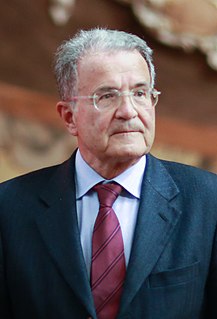
Romano Prodi is an Italian politician, economist, academic, civil servant and manager who served as the 10th President of the European Commission from 1999 to 2004. He served twice as Prime Minister of Italy, first from 17 May 1996 to 21 October 1998 and then from 17 May 2006 to 8 May 2008. He is considered the founder of the Italian centre-left and one of the most prominent and iconic figures of the so-called Second Republic. Prodi is often nicknamed Il Professore due to his academic career.

Giovanni Leone was an Italian politician, jurist and university professor. A founding member of the Christian Democracy (DC), Leone served as the sixth president of Italy from December 1971 until June 1978.

Enrico Letta is an Italian politician who served as Prime Minister of Italy from April 2013 to February 2014, leading a grand coalition of centre-left and centre-right parties. Since March 2021, Letta has been Secretary of the Democratic Party (PD).
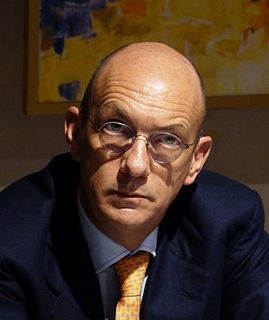
Marco Follini is an Italian politician and journalist.

Giorgio Napolitano is an Italian politician who served as the 11th President of Italy from 2006 to 2015, and the only Italian president to be reelected to the presidency. Due to his dominant position in Italian politics, some critics have sometimes referred to him as Re Giorgio. He is the longest serving president in the history of the modern Italian Republic, which has been in existence since 1946.
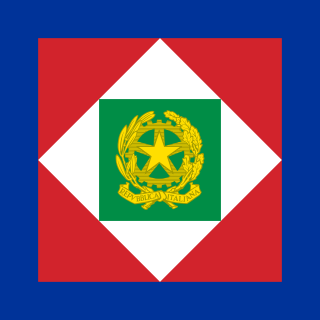
The president of Italy, officially denoted as President of the Italian Republic is the head of state of Italy. In that role, the officeholder represents national unity, guarantees that Italian politics comply with the Constitution of Italy and is the head of the Italian Armed Forces. The president's term of office lasts for seven years. The current holder is former Constitutional Judge Sergio Mattarella, who was elected on 31 January 2015.

The Italian presidential election of 2006 was held on 8–10 May 2006. The result was the election of Giorgio Napolitano, the first time a former member of the Italian Communist Party had been elected to the Presidency of the Italian Republic.

Sergio Mattarella is an Italian politician, jurist, academic and lawyer who has served as the 12th and current president of Italy since 2015.
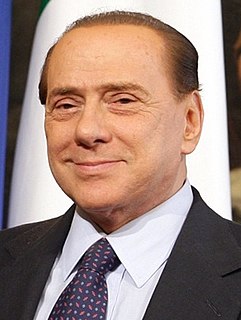
A snap general election was held in Italy on 13–14 April 2008. The election came after President Giorgio Napolitano dissolved Parliament on 6 February 2008, following the defeat of the government of Prime Minister Romano Prodi in a January 2008 Senate vote of confidence and the unsuccessful tentative appointment of Franco Marini with the aim to change the current electoral law. Under Italian law, elections must be held within 70 days of the dissolution. The voting determined the leader of Italy's 62nd government since the end of World War II. The coalition led by ex-Prime Minister Silvio Berlusconi from The People of Freedom party defeated that of former Mayor of Rome, Walter Veltroni of the Democratic Party.

Massimo D'Alema is an Italian politician who was the 53rd Prime Minister from 1998 to 2000. Later he was Deputy Prime Minister and Minister of Foreign Affairs from 2006 to 2008. He is also a journalist and served for a time as national secretary of the Democratic Party of the Left (PDS). Sometimes media refers to him as Leader Maximo, due to his first name Massimo, but also for his dominant position in the left-wing coalitions during the Second Republic. Earlier in his career he was a member of the Italian Communist Party, and he was the first former communist to become prime minister of a NATO country and yet the only former communist prime minister of Italy.
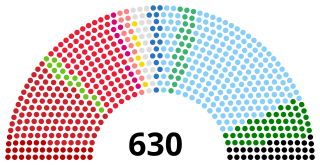
The Legislature XI of Italy was the 11th legislature of the Italian Republic, and lasted from 23 April 1992 until 14 April 1994. Its composition was the one resulting from the general election of 5 and 6 April 1992. The election was called by President Cossiga on 3 February 1992.

A general election took place on 24–25 February 2013 to determine the 630 members of the Chamber of Deputies and the 315 elective members of the Senate of the Republic for the 17th Parliament of the Italian Republic.

The Italian presidential election of 2013 was held in Italy on 18–20 April. The result was the re-election of Giorgio Napolitano, the first time a President had been elected for a second term.
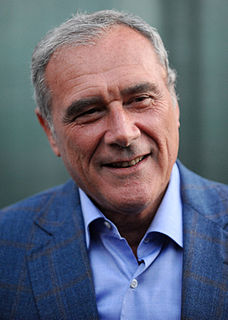
Pietro Grasso, also known as Piero Grasso, is an Italian anti-mafia magistrate and politician who served as President of the Senate from 2013 to 2018.

Maria Elena Boschi, is an Italian lawyer and politician, member of the Chamber of Deputies since 2013.

The Legislature XVII of Italy started on 15 March 2013 and ended on 22 March 2018. Its composition was the one resulting from the general election of 24–25 February 2013, called after the dissolution of the houses of Parliament announced by President Giorgio Napolitano on 22 December 2012.

The Legislature XVI of Italy started on 29 April 2008 and ended on 14 March 2013. Its composition resulted from the snap election of 13–14 April 2008, called after President Giorgio Napolitano dissolved the houses on 6 February 2008. The dissolution of the Parliament was a consequence of the defeat of the incumbent government led by Romano Prodi during a vote of confidence in the Senate.

The Legislature XV of Italy started on 28 April 2006 and ended on 28 April 2008. Its composition resulted from the election of 9–10 April 2006, called after President Ciampi dissolved the houses on 11 February 2006, at the end of the previous legislature. This legislature was the second shortest in the history of the Italian Republic, lasting exactly two years, and ending when President Giorgio Napolitano dissolved the houses on 6 February 2008, after a vote of no confidence on the incumbent Prodi Cabinet.

The Legislature XIV of Italy started on 30 May 2001 and ended on 27 April 2006. Its composition resulted from the general election of 13 May 2001. The election was called by President Ciampi, after he dissolved the houses of Parliament on 8 March 2001. The legislature ended after its natural course of five years, soon after the houses were dissolved again by Ciampi on 11 February 2006.
References
- ↑ Koff, Stephen P. (2002). Italy: From the 1st to the 2nd Republic, p. 221. Routledge.
- ↑ Ferrari, Giuseppe Franco (2008). Introduction to Italian Public Law, p. 161. Giuffrè Editore
- ↑ Costituzione della Repubblica Italiana, Article 88 and Note 11. Retrieved 22 April 2013 (in Italian).
- ↑ La Repubblica (24 May 1991). "Il semestre bianco". Retrieved 22 April 2013 (in Italian).
- ↑ Cinelli, Francesca (21 April 2013). "Italy center-left leader Bersani quits after vote debacle". Reuters. Retrieved 22 April 2013.
- ↑ Scarpetta, Vincenzo (26 February 2013). "Italian elections have triggered fresh uncertainty in the eurozone. What happens next?". Il Sole 24 Ore . Retrieved 22 April 2013.
- ↑ L'Arena (22 April 2013). "Si prepara il Governo del presidente e potrebbero entrare due veronesi". Retrieved 22 April 2013 (in Italian).
- ↑ BBC News (20 April 2013). "Italy crisis: President Giorgio Napolitano re-elected". Retrieved 22 April 2013.